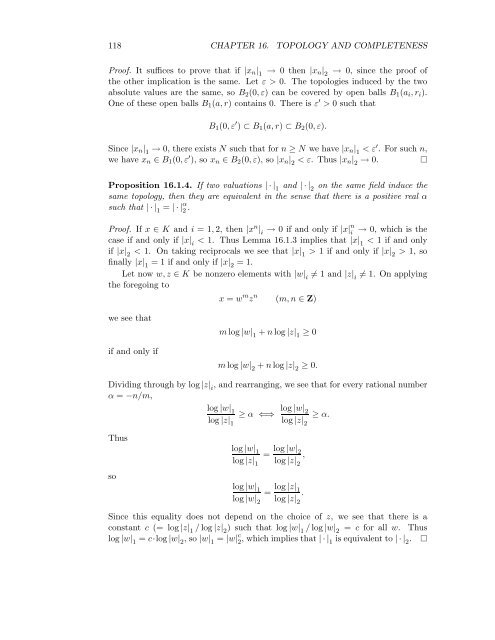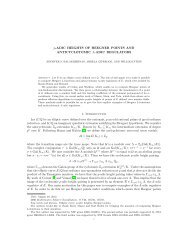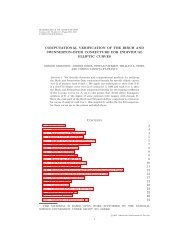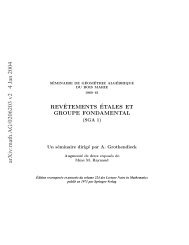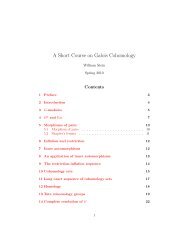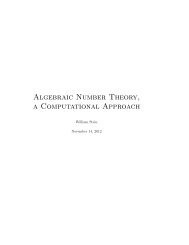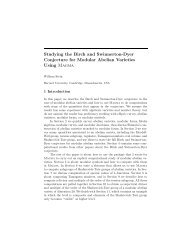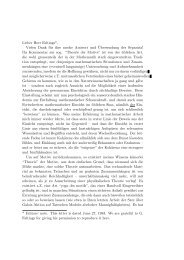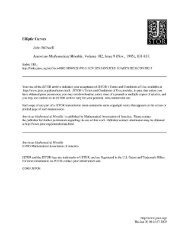A Brief Introduction to Classical and Adelic Algebraic ... - William Stein
A Brief Introduction to Classical and Adelic Algebraic ... - William Stein
A Brief Introduction to Classical and Adelic Algebraic ... - William Stein
Create successful ePaper yourself
Turn your PDF publications into a flip-book with our unique Google optimized e-Paper software.
118 CHAPTER 16. TOPOLOGY AND COMPLETENESS<br />
Proof. It suffices <strong>to</strong> prove that if |xn| 1 → 0 then |xn| 2 → 0, since the proof of<br />
the other implication is the same. Let ε > 0. The <strong>to</strong>pologies induced by the two<br />
absolute values are the same, so B2(0, ε) can be covered by open balls B1(ai, ri).<br />
One of these open balls B1(a, r) contains 0. There is ε ′ > 0 such that<br />
B1(0, ε ′ ) ⊂ B1(a, r) ⊂ B2(0, ε).<br />
Since |xn| 1 → 0, there exists N such that for n ≥ N we have |xn| 1 < ε ′ . For such n,<br />
we have xn ∈ B1(0, ε ′ ), so xn ∈ B2(0, ε), so |xn| 2 < ε. Thus |xn| 2 → 0.<br />
Proposition 16.1.4. If two valuations | · | 1 <strong>and</strong> | · | 2 on the same field induce the<br />
same <strong>to</strong>pology, then they are equivalent in the sense that there is a positive real α<br />
such that | · | 1 = | · | α<br />
2 .<br />
Proof. If x ∈ K <strong>and</strong> i = 1, 2, then |xn | i → 0 if <strong>and</strong> only if |x| n<br />
i → 0, which is the<br />
case if <strong>and</strong> only if |x| i < 1. Thus Lemma 16.1.3 implies that |x| 1 < 1 if <strong>and</strong> only<br />
if |x| 2 < 1. On taking reciprocals we see that |x| 1 > 1 if <strong>and</strong> only if |x| 2 > 1, so<br />
finally |x| 1 = 1 if <strong>and</strong> only if |x| 2 = 1.<br />
Let now w, z ∈ K be nonzero elements with |w| i = 1 <strong>and</strong> |z| i = 1. On applying<br />
the foregoing <strong>to</strong><br />
we see that<br />
if <strong>and</strong> only if<br />
x = w m z n<br />
(m, n ∈ Z)<br />
mlog |w| 1 + n log |z| 1 ≥ 0<br />
mlog |w| 2 + n log |z| 2 ≥ 0.<br />
Dividing through by log |z| i , <strong>and</strong> rearranging, we see that for every rational number<br />
α = −n/m,<br />
Thus<br />
so<br />
log |w| 1<br />
log |z| 1<br />
≥ α ⇐⇒ log |w| 2<br />
log |z| 2<br />
log |w| 1<br />
log |z| 1<br />
log |w| 1<br />
log |w| 2<br />
= log |w| 2,<br />
log |z| 2<br />
= log |z| 1.<br />
log |z| 2<br />
≥ α.<br />
Since this equality does not depend on the choice of z, we see that there is a<br />
constant c (= log |z| 1 / log |z| 2 ) such that log |w| 1 / log |w| 2 = c for all w. Thus<br />
log |w| 1 = c·log |w| 2 , so |w| 1 = |w| c<br />
2 , which implies that | · | 1 is equivalent <strong>to</strong> | · | 2 .


